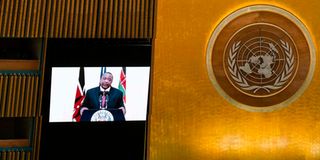Smoke-and-mirror stories leaders tell at UN assembly

Kenya's President Uhuru Kenyatta remotely addresses the 76th session UN General Assembly on September 22, 2021, in New York.
President Uhuru Kenyatta’s address to the 76th Session of the United Nations General Assembly last week contained all the platitudinal strokes that give the annual ritual in New York its cathartic effect.
Its release mechanism rests on the fact that the leaders annually troop to New York, or in Mr Kenyatta’s case, deploy technology to tell fellow leaders and a generally disinterested world about the great things that their governments are doing to uplift the lives of their people and their contribution to the global priorities as identified by the UN and other international agencies.
The applause at the end of the presentations is usually affirmation that the world has heard and is impressed and that the presidents can fly home, relieved.
In our case, the world was told of the great initiatives that the government implemented to mitigate the impact of Covid-19 and, relative to experiences in other countries, was thus able to record fewer fatalities. While fewer fatalities is not a uniquely Kenyan accolade (many other African countries can boast the same), the President’s call for vaccine equity to protect Africa’s populations against the new Covid strains was spot on.
He spoke about the country pursuing a robust green economy and implementing a comprehensive climate-responsive policy. He probably should have nuanced it to say that we are committed to implementing these such policies but not that they are robustly being pursued.
Plastic bottles
The government’s very progressive ban on the use of plastic bags is not being adequately policed and cases have been reported of such bags finding their way into the country and being used.
Plastic bottles continue to litter the environment and have seriously polluted our rivers, beaches and even parks.
Rivers have dried up because of deforestation and efforts to reclaim important water towers like the Mau Forest are heavily politicised. Firewood continues to be a key source of energy for vast rural populations, undermining efforts to protect trees and successfully implement national targets like the one launched three years ago to plant close to two billion trees by 2022. It does not help that efforts to promote alternative energy sources hardly take off because of cost, policy overlaps, etc.
The digital reality
The reported success of shielding about 3.3 million households against extreme hunger and reducing malnutrition by 27 per cent is of course laudable because it demonstrates effort. But it must be placed into context by highlighting the fact that a lot more could and can be achieved if the government stopped treating agriculture as an also-ran in the hierarchy of ministries.
The impact of technology and opportunities presented by the digital reality notwithstanding, agriculture will hold the key to transforming people’s lives positively for the foreseeable future.
It remains a major employer and is the only guarantor of food security, although much remains to be done to reduce the unacceptably high post-harvest losses. Such is its criticality that the success of most of the UN Sustainable Development Goals are tied directly to the assurance of food security and, by extension, to agriculture.
Whether it is ending poverty, ensuring good health and well-being for all, providing quality education, achieving gender equality, or responsible production and consumption, there is a link to agriculture.
It is not impossible for Kenya to invest a minimum of 10 per cent of its national budget in agriculture. In fact, is imperative that it does so. The recent commitment to revive the 4-K Clubs that introduced agriculture to young people in schools is laudable. But the commitment must be resourced and robust implementation structures put in place if the objective of ennobling agriculture as a vocation in the eyes of young people is to be achieved.
Interestingly and coincidentally, New York was last week also the venue of the UN Food Systems Summit, which focused attention on a wide range of issues around the entire food value chain and how robust it is, and must be, to ensure sustainable food security.
So, as our President ticked off what he considered laudable successes that his government has achieved, the inescapable feeling was the disconnect between what was being said and what was happening on the ground. Lofty ambitions and targets have not fully translated into palpable realities on the ground.
But people must live and experience these realities for them to truthfully and willingly join in the applause the presidents gathered at the General Assembly give each other.
[email protected], @tmshindi





